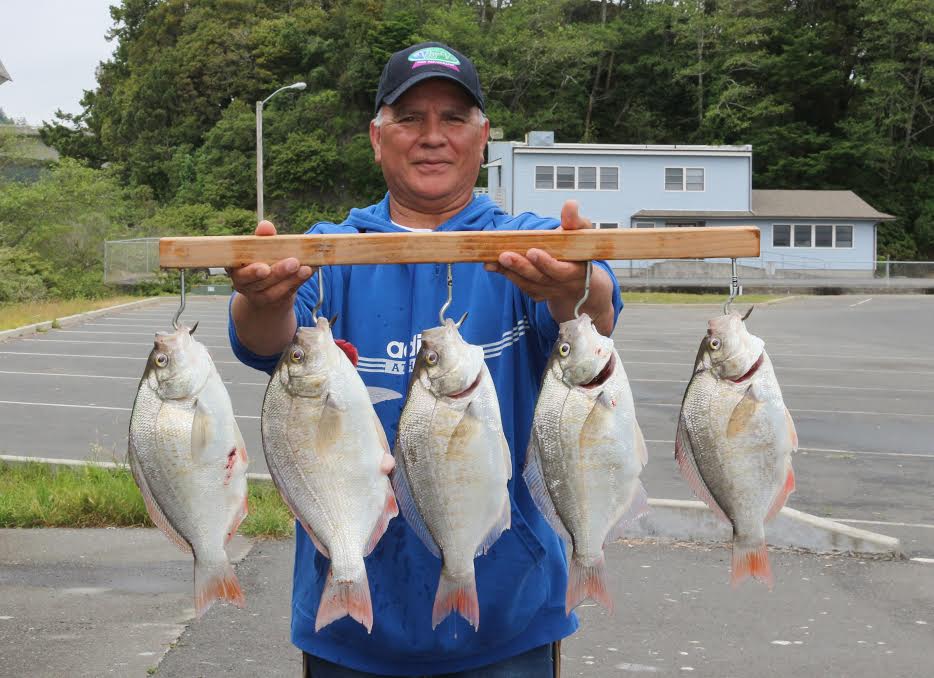
Both wild and hatchery Chinook may now be retained on the lower Rogue as part of an angler's 2-salmon daily limit, and although the action may not be red hot, the wild-fish retention will definitely have an effect on angler harvest picking up across the board by at least 30 percent.
"We did get some wild fish today," said Jim Carey, owner of the Rogue Outdoor Store in Gold Beach on Thursday, the opening day for wild-fish retention. "I'd say that the fishing is up to 4 times better than most of the days that we've had over the past couple weeks. And we're seeing a few more fish maybe moving in."
The fact that anglers are doing a little better is not surprising since angler participation in the lower Rogue fishery has been dwindling as of late, due to having to release a higher-than-usual percentage of wild fish. Even so, some anglers are still managing to catch their fair share of hatchery kings.
"Guide Greg Eide was the hot boat today with 5 Chinook," said guide John Anderson on Thursday. "Greg had 3 hatchery kings and 2 wild ones today."
There are mixed reports of where the fish have been haunting, but the most logical explanation is that the majority of them have been hanging downriver from the old mill site.
When the Army Corps of Engineers releases water out of Lost Creek Dam, the Rogue River near the town of McLeod (just below Lost Creek Lake) has been averaging between 48 and 52 degrees. This is a salmon's ideal comfort zone, a temperature range that tends to keep the springers alive the longest until they are able to spawn in the upper Rogue in the fall.
But when the river travels through the hot Rogue River Canyon and exits just below the town of Agness, the water warms up considerably. Last week's temperatures averaged between 60 and 64 degrees at Agness.
The Rogue warms up even more significantly as it travels further downriver. When it goes through the upper tidewater holes from Clay Banks down to John's Hole, the river can easily climb from 64 to 72 degrees - or even higher!
So at low tide, the upper tidewater holes fill with warm water, which forms a dam of warm water. Salmon don't dig this so much, so the warm-water dam pushes the salmon back to their ideal comfort zones in the Rogue bay and lower tidewater holes below Elephant Rock.
"The fish were lower today," noted Anderson on Thursday. "They went up to Elephant Rock and then they turned around and went back downriver. So none were taken out of Cannery Riffle or the north chute, and none were taken out of Clay Banks."
I expect that the bay will definitely be fit for trolling within the next few weeks or so.
Meanwhile the surfperch fishing has been totally off the charts. Everything from redtail surfperch to striped surfperch have been caught with abandon, with some of the largest redtail surfperch I have ever seen.
The usual surf fishing spots have been producing such as Crissey Field, McVay Park and Sporthaven Beach.
As you travel north from Brookings, the Pistol River Mouth, Kissing Rock, the Gold Beach south jetty spit and the Nesika Beach Wayside have been going off as well.
The hottest baits have been frozen raw shrimp (40 to 50 to the pack). Be sure to use at least half of the shrimp, especially the tail half. These big surfperch have big mouths to match!
I flipped out a two-hook rig and got hammered twice in rapid succession. The top hook got hammered by a gargantuan redtail which immediately became airborne and lifted the bottom surfperch partially out of the water.
After a line-peeling run, the rig got lighter but still had a 16-1/2 inch full-fledged fighter on the bottom hook - a respectable surfperch by anybody's standards. The top size 6 hook was almost completely straightened out.
The moral of this story is to tie your own snelled leaders using stronger hooks.
Tight lines!
Larry Ellis, author, writer, columnist and photographer has had a 50-year passion for fishing in California and Oregon's saltwater and freshwater venues. He is a well-known writer for Oregon, Washington and California Fishing and Hunting News, Northwest Sportsman, California Sportsman and Pacific Coast Sportfishing. He currently writes monthly for Salmon Trout Steelheader Magazine, and is the author of two books, "Plug Fishing for Salmon" and "Buoy 10, the World's Largest Salmon Run." Both books can be bought from Amato Publications (amatobooks.com), Amazon and eBay. Ellis particularly loves living in his hometown of Brookings, Oregon - The heart of salmon country and gateway to fishing paradise.
Report Date:
Anglers did not have to worry about catching fish last week. It was a matter of wishing for your favorite......
Report Date:
I remember when folks used to make statements like, "So when is the salmon season opening?" Or, "Will there be......